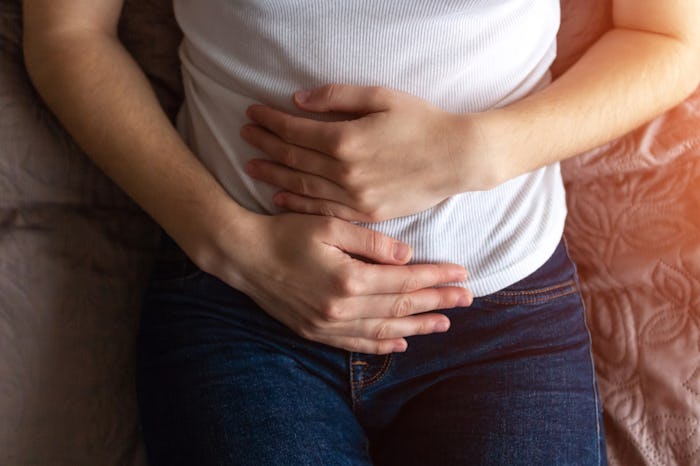Health

Experts Explain Why Ovulation Makes You Feel Bloated & Gassy
Ugh.
While some women have no idea when they're ovulating, others get such unpleasant signs from their bodies as cramps and bloating and breakouts. (And that's before the PMS even starts.) But can ovulation really cause gas? The answer is yes, but you might be surprised to find the reason why.
What is mittelschmerz?
To understand why you're feeling so uncomfortably bloated and gassy, it's helpful to learn about a little something called mittelschmerz, or 'middle pain.' "The release of the egg is actually the rupture of a cyst, and the cyst fluid comes out into the belly cavity, and you often get a bit of blood released, which can really irritate the lining of the body cavity, and give you discomfort," explains Mary Jane Minkin, MD, OB-GYN at Yale University, in an interview with Romper.
It makes sense that there would be some bodily responses to all of that internal action, like your belly looking swollen and feeling tender. And Dr. Minkin confirms that gas can also be a response: "Some [women] do react to the bit of fluid and blood irritating the abdominal cavity."
The irritation is real, too. One study found that ovulation pain "varies in severity from a mild ache to agonizing pain and is generally felt near the ovaries on the same side as the developing follicle."
What role does progesterone play?
In addition to that abdominal irritation, there is another reason why you might be experiencing gas and GI discomfort mid-cycle, and it's thanks to a little hormone called progesterone, which is made during ovulation, explains Dr. Minkin "Some women do not feel well in what's called the "luteal phase" (progesterone present) phase."
Some effects of progesterone can include a "delayed GI transit time," which means that food moves more slowing through the digestive tract, according to Today. So that's yet another reason why you could be feeling bloated and constipated in the days proceeding ovulation.
While all of this can make you curse your cycle, there are fortunately some things you can do to make the mittelschmerz time more tolerable. Drinking plenty of water, limiting your salt intake, and trying a magnesium supplement (if your doctor approves it), may help reduce your bloating symptoms, according to Healthline.
If you're dealing with gas, you can opt to eat more ginger, an herb that helps speed digestion, which means gas can move quickly through your system, according to Everyday Health.
And if you're ovulation-related flatulence is just downright embarrassing, you can always opt out of ovulating altogether by getting on the pill. "An easy way to avoid ovulation is to take an oral contraceptive pill regularly (one with both estrogen and progestin). They act to prevent you from getting pregnant by suppressing ovulation," explains Dr. Minkin.
Don't forget to cut yourself some slack around days 11-14 of your cycle. After all, there's a lot going on from the waist down during that time of the month.
Experts:
Mary Jane Minkin, OB/GYN at Yale University
Studies cited:
"Mittelschmerz" Nathan R. Brott 1, Jacqueline K. Le 2In: StatPearls [Internet]. Treasure Island (FL): StatPearls Publishing; 2020 Jan.2020 Jul 10.
https://pubmed.ncbi.nlm.nih.gov/31747229/
This article was originally published on